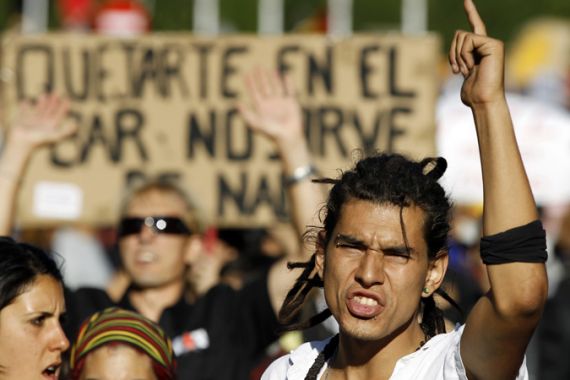Mass protests continue in Spanish capital
Thousands of “indignant” demonstrators are angered by politicians’ faliure to solve high unemployment and economic woes.

Thousands of Spain’s “indignant” protesters – including hundreds who crossed the country on foot – marched through Madrid and once again filled the town centre Sol square to demonstrate against high unemployment and the economic crisis.
Six columns of more than 500 protesters who marched for weeks from cities across Spain formed the core of Sunday’s demonstration.
The protesters who call themselves the “indignados” meaning the indignant or outraged, began converging on Madrid a day earlier, two months after they launched their movement.
On Sunday, they were joined by protesters who arrived in Madrid by bus from more than 30 cities as well as residents of the Spanish capital.
“Politicians don’t represent us! No! no! No!” the crowd chanted, with some waving handmade banners reading “It’s not a crisis, it’s the system that’s wrong”.
Some protesters began their march 34 days ago and walked 650km from the southwestern city of Cadiz.
Physiotherapists and masseurs accompanied demonstrators to treat them for aching legs and blistered feet.
Protesters outraged
Protesters said they were outraged with politicians for failing to solve Spain’s high unemployment and accuse them of being uncaring, corrupt and inept.
They first began demonstrating before the regional elections in May in response to the perceived failure of politicians to represent the electorate.
Demonstrators had set off from cities across the country at the end of June, including Barcelona, Malaga, Valencia and Bilbao.
Many used the opportunity to stop on the way to Madrid by holding public meetings to spread their message of outrage.
On Saturday, several dozen demonstrators stopped outside Jose Luis Rodriguez Zapatero’s, the Spanish prime minister’s, official residence just north of Madrid to wave banners and chant slogans.
“We’re here to keep up the momentum of the protests,” said Ivan Gracia, a student who came by bus from the northern city of Zaragoza and planned to spend the night in the square.
The protesters have won broad public support in their fight against austerity measures introduced by the Spanish government, with 200,000 people attending rallies across the country.
Too vague
The movement, although it has been able to gather large numbers of supporters, has been criticised for being too vague in its demands – but demonstrators say there are issues that everyone agrees on.
“In two months, we have had some good responses,” said demonstrator Fernando Carasa.”We have stopped about 60 expulsions, created social pressure and achieved a bigger mobilisation than any political party.”
The political leaders of the eurozone’s fourth largest economy have worked hard to convince investors the country will not follow Greece, Portugal and Ireland in needing a bailout.
But Spaniards say while this has been happening, their own worries are being ignored.
Unemployment has soared to 14-year highs and almost half of under-25s are out of work.
Banks have cut off credit lines, consumer prices are rising faster than the regional average, investment has been slashed and house prices have plummeted.
Earlier this month, the socialist government set new limits on the amount of money that banks can reclaim from mortgage defaulters in what was seen as an effort to appease the protesters.